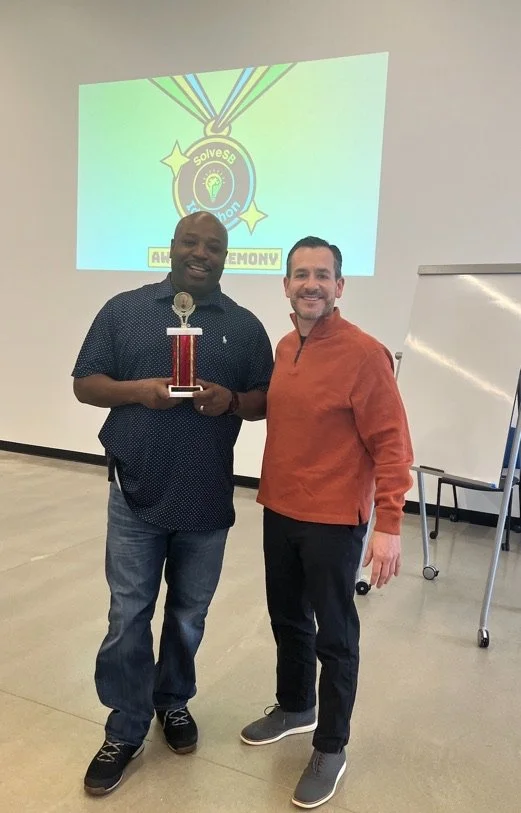Winning ideas: CFSB pitches multi-pronged approach to increase housing development
“Team Coveleski” takes top honors at 2023 Solve South Bend ideathon
March 23, 2023 | South Bend, IN
On a snowy Saturday morning in January, more than a dozen local thinkers convened at the South Bend Technology Resource Center to start brainstorming how to alleviate South Bend’s housing crisis.
From left, Fred Teague, Sam Centellas, and Lex Dennis present Team Coveleski’s ideas to a panel of judges at SolveSB.
By the time it was done, three of them – including CFSB’s own executive director Sam Centellas – had taken top honors. Among the ideas pitched by four competing teams, theirs was recognized as the most innovative and equitable.
“And complicated,” admits CFSB executive director Sam Centellas. “These housing problems are complicated, and there have to be multiple prongs to the solution.”
The Problem Statement
Hosted by the City of South Bend, SolveSB is billed as a South Bend-specific ideathon, “a collaborative event in which individuals from different specialties work together to solve an existing problem,” according to the program’s website.
At the kickoff event, each team rallied around a single problem statement: How can we increase the development of housing in our urban neighborhoods through innovative or new approaches to financing?
After a couple of work sessions, the teams reconvened to present their solutions to a panel of local planning and development experts.
A Multi-Pronged Approach
Centellas, with teammates Fred Teague and Lex Dennis, began by recognizing two main issues driving today’s housing crisis: not only is financing already hard to come by, but skyrocketing construction costs are making the problem worse.
“We aren’t talking about that enough,” admits Centellas. “How do we get costs down? Everyone's just trying to figure out how to help people pay for their house, but I think we've got to do both.”
Those two issues together – high construction costs, and the lack of financing options for new development in lower-income neighborhoods – create a pervasive problem known as an appraisal gap.
What is an appraisal gap?
Too often, “the cost to purchase and renovate a property, to turn it into a healthy and safe rental, is more than what the property will be worth,” explained Centellas at a recent panel discussion at Notre Dame.
He gives an example. “Near Notre Dame, a house that costs $250,000 to build will be worth $500,000 when you’re done. But that same house built on the west side might only be worth $140,000,” he explains.
If there’s a gap between what a home costs to build and it’s appraised value, banks generally won’t provide financing. That means neighborhoods with lower home values remain underdeveloped.
“So the first prong of our idea was to get costs down,” Centellas says.
Teague and Centellas accept the first place trophy on behalf of Team Coveleski.
We Make Things Here
During their brainstorming, the trio – named “Team Coveleski” – was quick to spot the unique resources in South Bend’s own backyard. “Our idea was to harness the efficiency and manufacturing capacity of the RV industry,” says Centellas.
In neighborhoods where vacant lots litter the landscape, Team Coveleski proposed, “could we buy, like, three square blocks and turn it into an RV-like factory for three weeks, and build ten houses on it?”
Centellas acknowledges the idea is easier said than done. But if anyone could do it, Team Coveleski pitched, it’s the local manufacturers who have already mastered mass production at scale. “There’s got to be a way to get construction costs down,” they said to the panel of judges. “We make things here.”
Creative Loan Guarantees
Even if costs are decreased, it still may not be enough. “That’s how bad the appraisal gap is in South Bend,” Centellas says. The second prong, team members pitched, requires help from government and nonprofit lenders who would be willing to cover the remaining gaps.
Centellas provides an example. “You’d expect a typical property here, once it’s developed, to appraise around $200,000,” he begins. “But a developer won’t be able to get $200,000 of financing.” Because traditional banks will typically only lend up to seventy percent of the expected value, the developer might expect a loan of $140,000. “But their costs will be higher. More like $180,000.”
In today’s community redevelopment practice, that difference is usually made up with subsidies such as government-funded community development grants, which can be unpopular with some taxpayers. “Our idea is not subsidies, but to find a different way to guarantee the loan. We want to get creative. Can government, can philanthropy, or others help secure these loans to make progress?” Centellas asks.
He adds, “creative finance is the business CDFI Friendly South Bend happens to be in. We think we can help make that happen.”
If you are a housing developer, entrepreneur or nonprofit seeking nontraditional finance options for your projects, email Sam Centellas at sam@cdfifriendlysouthbend.org for more information on how we might help.


